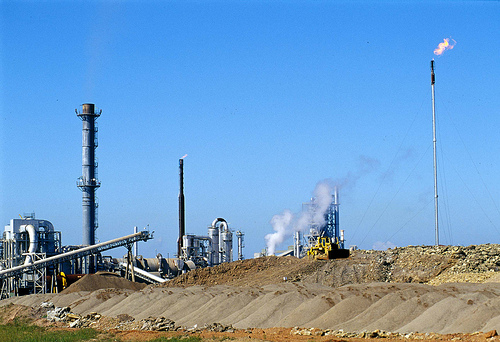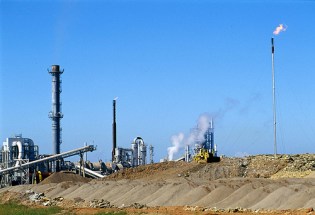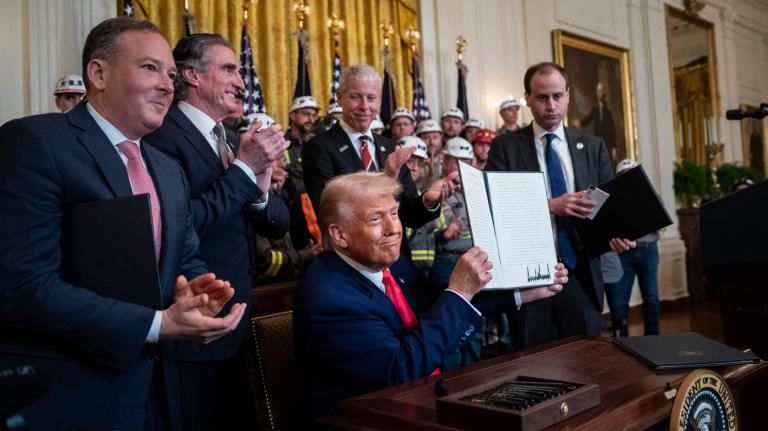Earlier this month, the Obama administration and the Republican-dominated House Natural Resources Committee took diametrically opposed steps regarding development of oil shale across the West. Not surprisingly, House Republicans are attaching the by-now-meaningless labels of “job creator” to its bill, and “job killing” to the Department of Interior’s action. Also not surprisingly, House Republicans’ views are not tethered to reality.
On Feb. 1, the House Natural Resources Committee approved a three-headed monster of an energy bill: drilling in the Arctic National Wildlife Refuge, drilling off the California coast, and expansion of oil shale drilling. But hey, the bill has the magic word “jobs” in the label, so it’s all good! The committee’s press release trumpets the quantity of oil shale lurking deep under the Green River formation (Colorado, Utah, and Wyoming), and the need for job creators’ certainty.
The committee doesn’t bother with the thirsty facts of oil shale mining. If drilling for easy oil can be analogized to sticking a straw into a lemon and watching juice seep up, obtaining oil from oil shale involves digging up fossilized lemons, reconstituting them with a lot of water — some estimates are five gallons of water for every gallon of oil — using vast quantities of energy to boil the watery, dried-out lemons, catching the vapor, distilling lemon juice vapor from water vapor, and dumping all that contaminated wastewater somewhere. All these activities will be taking place in western Colorado and eastern Utah, which are not exactly known for their abundance of water.
The committee also doesn’t bother with the economics of oil shale mining. The technology isn’t in place for commercial oil shale mining, and may never be. Oil shale, like nuclear fusion, has been “10 years away from commercial development” for much longer than 10 years; the Checks and Balances Project has compiled oil shale industry boosters’ promises [PDF] going back to 1916. Unlike Canadian oil sands (aka tar sands), oil shale has never been produced commercially in the United States.
Rep. Douglas Lamborn (R-Colo.), the author of the oil shale bill, also doesn’t seem to care about the reactions of Coloradoans. They’re fighting mad: “It’s not a good deal for us,” said Rifle Mayor Jay Miller, a Republican. “We’re not against oil shale or gas development here, we just want it done in a way that doesn’t drive us into the ground.” Western Slope small town residents worry about low royalty rates, water, infrastructure, and impact on outdoor recreation.
This water-gobbling bill is part of the terrible transportation bill (says The New York Times) now working its way through the House, less a serious policy document than a wish list for oil lobbyists (says the Los Angeles Times), and the “worst transportation bill I’ve ever seen” (says Republican Transportation Secretary Ray LaHood). A list of all the transport bill’s failings would be very long indeed. Oil shale, Arctic drilling, and California offshore drilling are all years away from generating revenue, if ever, so sticking them into a transport bill on the pretense that they’ll pay for roads defies credibility. The Congressional Budget Office finds the obvious — a not-commercially feasible technology will generate no revenue.
Why is this oil shale bill necessary? In November 2008, President Bush announced a plan to open up 2 million acres of public lands for oil shale. (I believe that among those 2 million acres were the leases bid upon by Tim DeChristopher.) In February 2011, President Obama announced a moratorium on the Bush expansion. Republicans want a permanent end to the moratorium. Meanwhile, on Feb. 3, 2012, Obama’s Department of the Interior ended the moratorium in a good way, by formally rolling back the expansion, from 2 million acres to about 500,000 acres, with vastly less commercial potential.
The Bureau of Land Managament’s (BLM) plan favors continued research and development of oil-shale technology, but no commercial leasing of 461,965 acres — 252,181 acres in Utah, 174,476 in Wyoming, and 35,308 in Colorado. In addition, nearly 100,000 acres would be made available in eastern Utah for development of tar sands. It’s a far smarter policy than Bush’s. But Republicans are furious. Utah’s Gov. Gary Herbert is fuming, the American Petroleum Institute is whining, and the entire Utah congressional delegation wants the BLM decision scrapped.
Now, a broader observation: This pair of actions illustrates a bit of a deficiency in the environmental movement, and among progressives as a whole. The Lamborn bill is a fossil-fuel giveaway, and deserves to be defeated. National environmental groups have already generated, and will continue to generate, thousands of signatures on hundreds of email petitions telling senators to reject the transport bill. It will be rejected in its current form, because drilling in the Arctic National Wildlife Refuge and off the California coast are non-starters for senators such as Barbara Boxer (D-Calif.).
In the meantime, Obama has done the mostly right thing here. He’s reduced the scope of a bad Bush decision by 75 percent. And he’s ensured that the remaining 25 percent will be used mostly for research and development, not to pad some oil company’s bottom line. Yet the decision has gone mostly unnoticed. No one is thanking Obama, Salazar, or the BLM for standing up to Big Oil. Of the half-dozen stories I read before writing this post, all but one include the American Petroleum Institute’s canned angry reaction, but only one story included a favorable reaction, and that was from a local sportsman’s group. If environmental groups are pleased, they’re not writing press releases, and they’re not running thank-you emails. And if the progressive blogosphere reacted, I blinked and missed it. We’re quick to hurl sticks when Obama and Salazar do the wrong thing. Why don’t we grow carrots?





